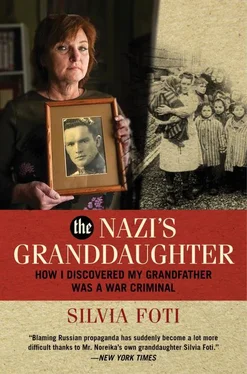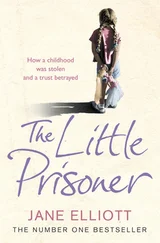When I visited other Chicago families who had come from the fatherland, I noticed that they had hung their Vytis next to a crucifix. But my mother had positioned ours next to a photograph of her dashing father in his military uniform. Thus, in my mind—and perhaps in hers, too—Vytis became blended with my mother’s father, Jonas Noreika. Although I had never known my grandfather, I had been taught to adore him as a hero who protected Lithuania. To me, it was Jonas Noreika riding that horse, brandishing that sword, bearing that shield, and dying valiantly as he battled our enemies.
CHAPTER ONE
A Daunting Legacy
Chicago 2000
By some strange cosmic quirk, my mother and grandmother lay in the same hospital at the same time, both in danger of dying. Our family matriarchy threatened to collapse as I watched helplessly.
The schedule that I had arranged for my vigil allowed me to shuttle between their hospital rooms during those two harrowing weeks. Mom’s room first.
Sitting at her bedside, holding her hand, rubbing it gently, I kept hearing in my mind the introduction to Beethoven’s Fifth Symphony. The imaginary pianist pounded his chords— dum!-da-da-dum! —which sounded in my mind like jackhammers demolishing my life. Mom gripped the bed rail, causing it to rattle as she tried to pull herself up to a sitting position and failed, grimacing from bone-deep, soul-deep pain. She had been battling diabetes and debilitating back pain for years, had been admitted for routine tests and had somehow contracted a deadly infection. I tried to help her sit up, but she groaned in agony, shook her head, and wilted. She crashed back into the pillows, breathing violently.
Desperate to do something, anything—and still thinking I could fend off the inevitable—I asked, “Can I get you something?”
She graced me with a task. “Just a rubber band to pull back my hair,” she whispered.
I took everything out of my purse—keys, wallet, pens—frantically searching for a rubber band. There had to be one in there. I found it and gently drew back her hair, which was damp with sweat and fear.
Then she complained of numbness in her left arm. “Maybe you can massage it?”
Welcoming the invitation to touch her, I slowly kneaded her arm, starting at her wrist and moving up to her elbow, as though working with clay. I desperately wanted to transform this shrunken wraith before me, this rag doll of her former self, to refashion her into the imperious opera diva who could belt out a high C.
“You know what this means, don’t you?” she asked.
I continued massaging her arm. “What, Mom?”
“You have to write the book.”
I studied her. “No, no, no, no. You’re going to do it yourself.”
She was past the denial that I was still clinging to. “You have to,” she insisted. “Everybody expects it.”
Still moving my hands up and down her arm, I looked out the window rather than at her pain-filled face. Outside on this end-of-January day, the temperature had plummeted below zero. The world had frozen. I wanted to sprint out of the room and run the way I used to, feet pounding the gravelly black track, sun scorching my shoulders, sweat dripping from my skin, feeling powerfully alive.
But Mom was waiting for me to answer. She had been working on a book about her father, the fabled hero, for as long as I could remember. She’d even earned a Ph.D. in literature five years ago in pursuit of improving her storytelling skills. I had always been in awe of this venture, observing all the sacrifices she’d made to collect material about my famous grandfather. I had waited eagerly for her to write his tale. Why she had never finished it, I didn’t know. Now she expected me to chase the legend that she’d recounted to me all my life. I could see in her eyes that she was determined to impose her will.
No! You can’t make me do this! My fingers caressed her hand, pleading. I didn’t want her to die and leave me bereft. The book had been everything to her, a lifelong mission. I didn’t want to think about why she was passing it on to me. Besides, I couldn’t write the book. Despite being a journalist, I didn’t believe I had the skills to write such a story. I had never attempted anything like it.
I heard her silent response: It is your duty to continue where I left off .
Obedient daughter that I was, I nodded, almost imperceptibly. And, almost imperceptibly, she acknowledged my promise. Then, smiling wanly with relief, she squeezed my hand with the last of her strength, sealing the contract. She closed her eyes and took a deep, satisfied breath. Soon her breathing became more even.
I unclasped my hand from hers and stood up to tend to the flowers sent by her friends—red roses mostly—that stood in vases on the windowsill facing the snow-blanketed park. Mom loved red roses. She had always had bunches thrown at her feet when she sang in the opera. I inhaled their fragrance. Noticing a dead one, I pulled it out, pricking my finger on a thorn.
As I gazed on my mother in her last hour of consciousness, wondering how I would fulfill this insane deathbed promise, I had no hint that our pact would rouse the dormant genocide genie in Lithuania, jolt the comatose country out of its stupor of guiltlessness, and force it into a reckoning that would scorch its conscience with lightning bolt after lightning bolt of blame. Sucking the drops of blood from my punctured finger, tasting their iron zip, I could not foresee the trajectory of my journey through the blood-sodden forests of Lithuania, or how my investigation would become linked with a court case against the country’s great arbiter of history by a descendant of my grandfather’s victims. This destiny of doom loomed far into the future; it would take twenty more years to reap. All I knew then was that my mother’s impending death was much too much to bear, and my only guide was love.
My grandmother’s room was two floors up, where she had been recovering from a heart attack. When I went to check on her, she was asleep. Wrenched by the twin disasters, I resumed my pacing of the hallways, dodging the nurses and convalescent patients with their portable IVs rolling along beside them. I wanted to pound my fists into the wall and leave two gaping holes.
The next day, Mom was unconscious, tangled in a web of tubes, her breathing a series of gurgles. I massaged her arm again, as she had requested the previous day. Her left hand, swollen like a water balloon, no longer responded to the pressure of my touch. Squeeze . Nothing. Squeeze . Nothing. Now, finally, I was forced to accept the fact that she wouldn’t wake up—not for my father, not for my younger brother, and not for me.
I was thirty-eight years old with a husband and two children, and she had told me there was nothing more she could do for me. She’d been telling me what to do for so long that I’d learned to read her mind. She dominated mine. I felt as if I were an extension of her. She knew instinctively that she controlled me. Even now, her voice in my head counseled sternly, Don’t embarrass me or Lithuania by leaving your grandfather’s story untold. I was powerless to resist.
Her eyelids were open only a millimeter. I leaned over to search those tiny slits for someone I could recognize. There was nothing but a milky cloud hovering in the sky of eternity.
I needed comfort. I staggered out of my mother’s room to go to my grandmother. Močiutė, as I had always called her, was recovering from her heart attack and would soon be sent home. When I entered her room, she was sitting up in bed, pillows stacked behind her, devouring a lunch of fried chicken and mashed potatoes oozing butter. The smell sickened me. The cooked white breast meat reminded me of rotting flesh. I couldn’t imagine ever wanting to eat again.
Читать дальше











